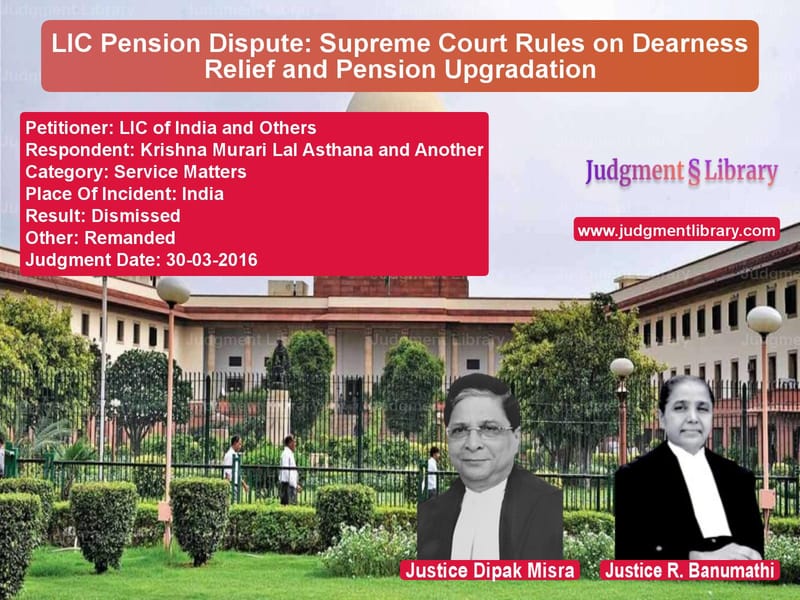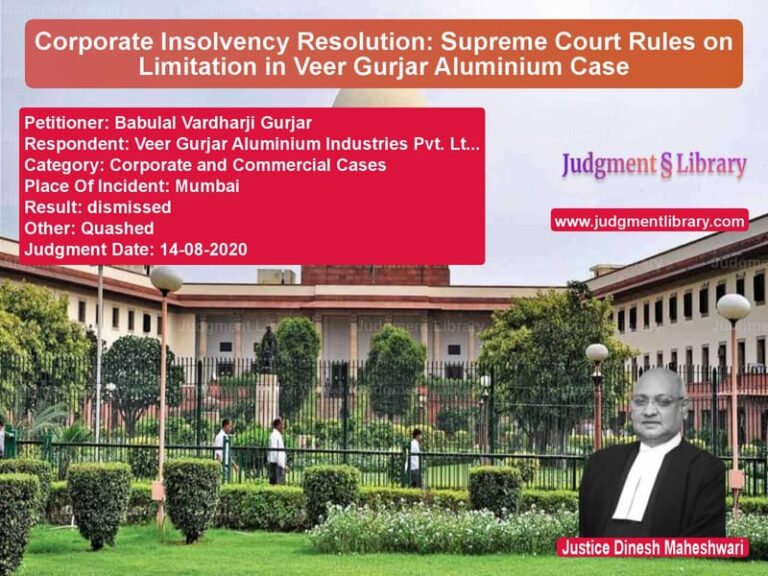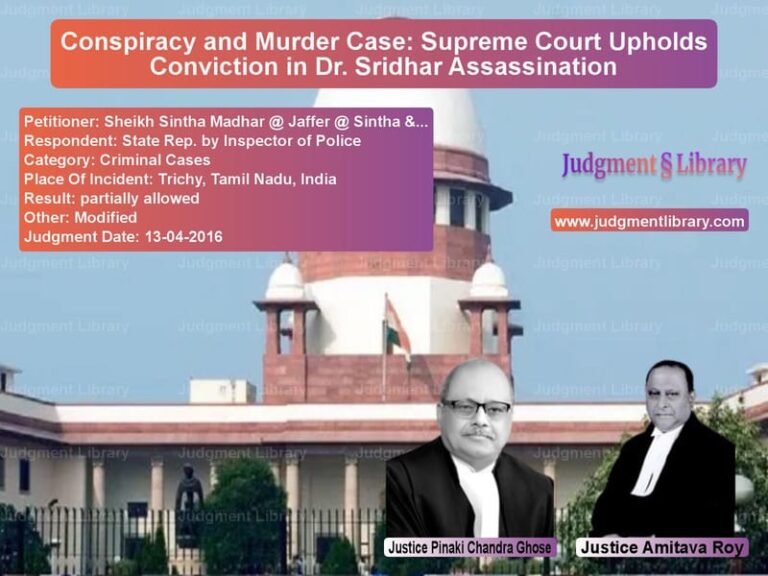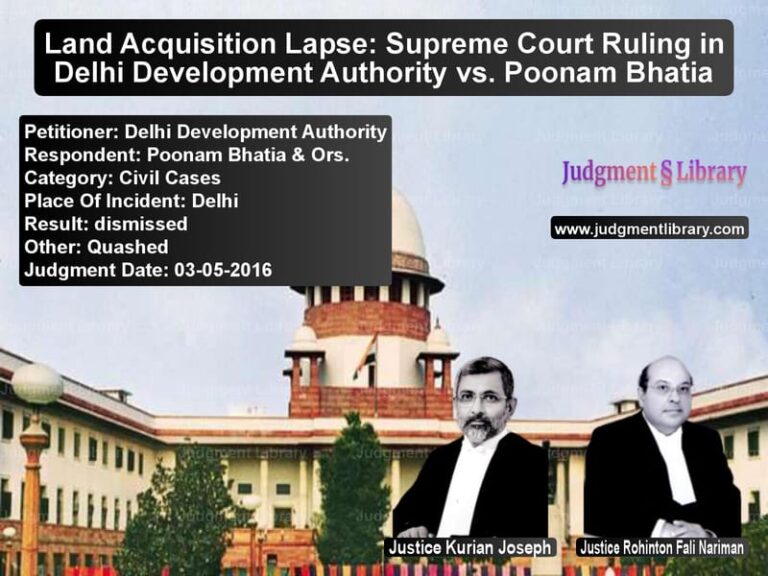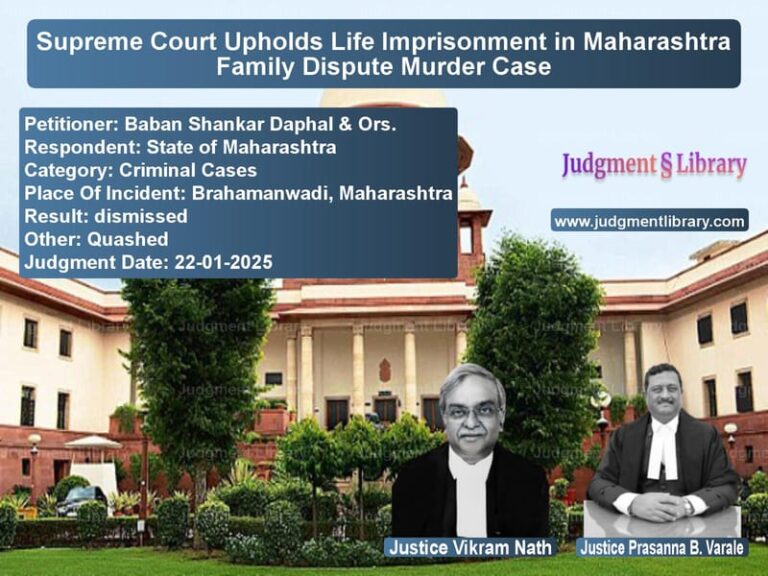LIC Pension Dispute: Supreme Court Rules on Dearness Relief and Pension Upgradation
The Supreme Court of India, in Civil Appeal Nos. 8959-8962 of 2013, along with related appeals, addressed the contentious issue of pension benefits and dearness relief for retired employees of the Life Insurance Corporation of India (LIC). The case revolved around the applicability of pension rules, particularly the upgradation of pensions and the rate of dearness relief, which had become a subject of legal dispute between the employees and the corporation.
Background of the Case
The appellants, LIC of India and others, challenged the High Court’s ruling that had directed LIC to implement its Board resolution dated 24th November 2001, which proposed upgrading pensions and neutralizing dearness relief. The respondents, led by Krishna Murari Lal Asthana and other retired employees, contended that LIC had discriminated among different categories of pensioners by applying different dearness relief rates based on retirement dates.
The primary dispute centered around whether the resolution passed by LIC could be implemented without approval from the Central Government and whether pensioners who retired before a specific cut-off date were being unfairly denied enhanced pension benefits.
Legal Issues Considered
- Whether the LIC Board resolution regarding pension upgradation and dearness relief was legally enforceable without Central Government approval.
- Whether different rates of dearness relief for different categories of pensioners violated Article 14 of the Constitution, which guarantees equality before the law.
- Whether pension upgradation should automatically follow pay revisions for serving employees.
- Whether judicial interference was justified in directing LIC to grant pension upgradation and enhanced dearness relief.
Petitioners’ Arguments
LIC, as the appellant, argued that pension benefits and dearness relief were governed by the Life Insurance Corporation of India (Employees) Pension Rules, 1995, framed under Section 48 of the LIC Act, 1956. The corporation contended that the Board resolution was merely a proposal and could not be implemented without the Central Government’s approval.
The petitioners also pointed out that the Board resolution of 2001 was never notified as a rule under Section 48 of the Act, making it legally unenforceable. LIC’s counsel emphasized that:
“In terms of Rule 55, the Chairman of the Corporation has been authorized to issue instructions which are necessary and expedient for the implementation of the rules. The Board can pass a resolution, but it does not authorize the Board to take a decision with regard to certain matters which are within the domain of the rule-making authority.”
Respondents’ Arguments
The respondents, retired employees of LIC, argued that pension was a vested right and that dearness relief should be neutralized equally for all pensioners, regardless of their retirement date. They relied on precedents such as D.S. Nakara v. Union of India, where the Supreme Court held that classifying pensioners into different groups based on a cut-off date was arbitrary and unconstitutional.
They further contended that the LIC Board had already acknowledged the disparity in dearness relief and had sought to correct it through the 2001 resolution. The failure to implement the resolution, they argued, was unjust and amounted to discrimination.
Supreme Court’s Observations
The Supreme Court acknowledged that pension was not a bounty but a right. However, it emphasized that any modification or enhancement of pension benefits must be done through rule-making authority as prescribed under Section 48 of the LIC Act.
“On a perusal of Section 48, it is clear as crystal that conferment of benefit, either pension or anything ancillary thereto, has to be conferred by the rules, and the rule as prescribed under Section 48 of the Act is to be tabled before the Parliament.”
The Court held that since the Board resolution was not formalized as a rule, it could not be enforced against LIC.
Judgment and Directives
The Supreme Court ruled in favor of LIC, overturning the High Court’s directive to implement the 2001 Board resolution. However, recognizing the hardships faced by pensioners, the Court made the following interim arrangements:
- The issue of constitutional validity of different dearness relief rates must be examined separately by the Delhi High Court.
- Pending final adjudication, LIC was directed to release 40% of the amount payable under the Board resolution within six weeks.
- The case was transferred from the High Courts of Rajasthan and Punjab & Haryana to the Delhi High Court for a consolidated decision.
The Court clarified that it was not expressing any opinion on the merits of the demand for pension upgradation but was only ruling on the enforceability of the Board resolution.
Key Takeaways from the Judgment
- LIC Board resolutions on pension matters are not automatically enforceable and require formal approval from the Central Government.
- Differential rates of dearness relief for pensioners need further judicial scrutiny to determine their validity under Article 14 of the Constitution.
- The Supreme Court directed interim relief for affected pensioners while awaiting a final decision.
Implications of the Judgment
The ruling clarifies that statutory bodies like LIC must seek governmental approval before implementing financial decisions that affect employees and pensioners. It also highlights the judiciary’s role in balancing legal compliance with social justice concerns. The case remains significant as it keeps the door open for pensioners to challenge discriminatory pension structures in future litigation.
Don’t miss out on the full details! Download the complete judgment in PDF format below and gain valuable insights instantly!
Download Judgment: LIC of India and Oth vs Krishna Murari Lal A Supreme Court of India Judgment Dated 30-03-2016-1741854020868.pdf
Direct Downlaod Judgment: Direct downlaod this Judgment
See all petitions in Pension and Gratuity
See all petitions in Public Sector Employees
See all petitions in Employment Disputes
See all petitions in Judgment by Dipak Misra
See all petitions in Judgment by R. Banumathi
See all petitions in dismissed
See all petitions in Remanded
See all petitions in supreme court of India judgments March 2016
See all petitions in 2016 judgments
See all posts in Service Matters Category
See all allowed petitions in Service Matters Category
See all Dismissed petitions in Service Matters Category
See all partially allowed petitions in Service Matters Category

